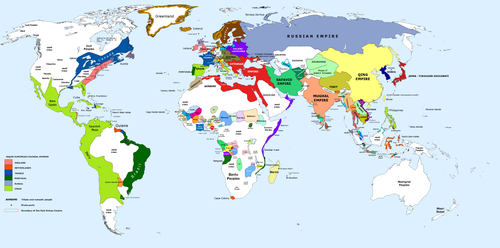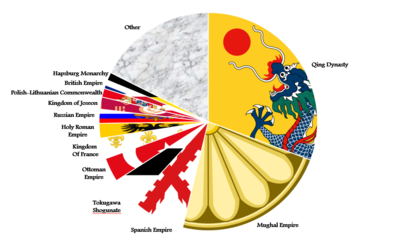List of countries by population in 1700
Appearance
| Historical Demographics | ||
|---|---|---|
 Altar of Domitius Ahenobarbus | ||
| Articles | ||
| Demographic history | ||
| Historical demography | ||
| World population estimates | ||
| List of Countries by Population | ||
| 1600 | 1700 | 1800 |
This is a list of countries by population in 1700. Estimate numbers are from the beginning of the year and exact population figures are for countries that held a census on various dates in the 1700s. The bulk of these numbers are sourced from Alexander V. Avakov's Two Thousand Years of Economic Statistics, Volume 1, pages 18 to 20, which cover population figures from the year 1700 divided into modern borders. Avakov, in turn, cites a variety of sources, mostly Angus Maddison.


See also
[edit]- List of countries by population
- List of countries by population in 1000
- List of countries by population in 1500
- List of countries by population in 1600
- List of countries by population in 1800
- List of countries by population in 1900
- List of countries by population in 2000
- List of countries by population in 2005
Notes
[edit]References
[edit]This article includes a list of general references, but it lacks sufficient corresponding inline citations. (January 2016) |
- ^ "The World at Six Billion". UN Population Division. Archived from the original on March 5, 2016., Table 2
- ^ Böröcz, József (10 September 2009). The European Union and Global Social Change. ISBN 9781135255800. Retrieved 26 June 2017.
- ^ Rowe, William T. (2009). China's Last Empire: The Great Qing. p. 91.
- ^ Jiang, Tao (2011). A Brief History of Population in China. Social Science Academic Press.
- ^ Avakov 2015.
- ^ a b c d e f g h i j Avakov, Alexander V. (April 2015). Two Thousand Years of Economic Statistics, Volume 1. ISBN 9781628941012. Retrieved 6 May 2016.
- ^ a b c d e Maddison (27 July 2016). "Growth of World Population GDP and GDP Per Capita before 1820" (PDF). Retrieved 29 September 2017.
- ^ "religiya-karaimov" (PDF).
- ^ a b Murgescu, Bogdan (14 June 2016). Romania si Europa. Polirom. pp. 75–76. ISBN 9789734620418.
- ^ The combined population of Germany (15m), Austria (2.5m), Czechia (3.242m), Belgium (2m), Slovenia (0.248m), and a third of Italy (4.4m), Avakov, p. 18-20.
- ^ J.P. Sommerville. "The Holy Roman Empire in the Seventeenth Century". Retrieved 21 May 2017.. Archived here. The figure of 20 million is given for "Germany, Austria, and Bohemia", a definition of the Empire that specifically excludes the Empire's Italian territories such as the Savoyard state, Milan, and Tuscany, as well as its territories in the Low Countries.
- ^ a b Avakov, p. 18.
- ^ a b And related territories roughly covering the modern borders of Austria. Avakov, p. 18.
- ^ Dwyer, Philip G. The Rise of Prussia 1700–1830. United Kingdom: Taylor & Francis, 2014. Page 52. The population of all of the King in Prussia's domains is given as 1.5 million in 1713, and the bulk of these lived within the Empire, rather than in the smaller and more barren holding in Ducal Prussia.
- ^ Wilson, Peter H. War, State and Society in Württemberg, 1677–1793. 1995. Page 43.
- ^ Peter Wilson. "German Armies: War and German Society, 1648–1806." 2002. Page 21. Combined population of Luneberg and Brunswick-Wolfenbuttel.
- ^ Jean-Noël Biraben, "The History of the Human Population From the First Beginnings to the Present" in "Demography: Analysis and Synthesis: A Treatise in Population" (Eds: Graziella Caselli, Jacques Vallin, Guillaume J. Wunsch) Vol 3, Chapter 66, pp 5–18, Academic Press, San Diego. (2005)
- ^ a b "Population Statistics: Historical Demography". Archived from the original on 23 February 2015. Retrieved 29 June 2016.
- ^ "A History of Spain and Portugal". Retrieved 29 June 2016.
- ^ Blake, Stephen P., ed. (2013), "Safavid, Mughal, and Ottoman Empires", Time in Early Modern Islam: Calendar, Ceremony, and Chronology in the Safavid, Mughal and Ottoman Empires, Cambridge: Cambridge University Press, pp. 21–47, doi:10.1017/CBO9781139343305.004, ISBN 978-1-107-03023-7, retrieved 2021-11-10
- ^ a b c d e "European Population History". Retrieved 30 June 2016.
- ^ Roughly the modern borders of Slovenia. Avakov, p. 20.
- ^ Mitchison, A History of Scotland, pp. 291–2 and 301-2.
- ^ MArshall, John (1838). "Statistics of the British Empire".
- ^ Grada, C. O. (1979). "The Population of Ireland: 1700–1900, A Survey". Annales de Démographie Historique. 1979: 281–299. doi:10.3406/adh.1979.1425.
- ^ "ESTIMATED POPULATION OF AMERICAN COLONIES: 1610 TO 1780".
- ^ "Population of the English West Indies, 1655–1755" (PDF).
- ^ Based on 1618 population map Archived 2013-02-17 at the Wayback Machine (p.115), 1618 languages map (p.119), 1657–1667 losses map (p.128) and 1717 map Archived 2013-02-17 at the Wayback Machine (p.141) from Iwo Cyprian Pogonowski, Poland a Historical Atlas, Hippocrene Books, 1987, ISBN 0-88029-394-2
- ^ Li 1998, p. 160-171.
- ^ "Data on Angola | Reconstructing Global Inequality". clio-infra.eu. Retrieved 2022-07-11.
- ^ "It is suggested that the actual population of the Ahom territories up to the Manas ranged from two to three millions over one-and-a-half century ending 1750." Guha, Medieval Northeast India:Polity, Society and Economy, 1200-1750 A.D. pp. 26–30.
- ^ Dwyer, p. 52.
- ^ Geoffrey Symcox. "Victor Amadaeus II: Absolutism in the Savoyard State, 1675–1730." Page 245.
- ^ Cornell, James (1978). Lost Lands and Forgotten People. Sterling Publishing Company. p. 24. ISBN 978-0-8069-3926-1.
Zimbabwe continued to grow, reaching the height of its power in 1700, under the rule of the Rozwi people. When the first Europeans arrived on the African coast, they heard tales of a great stone city, the capital of a vast empire. The tales were true, for the Rozwi controlled 240,000 square miles [...] More than one million Africans lived under Rozwi rule.
- ^ Clarke, Michael Edmund (2008-04-10). "In the Eye of Power: China and Xinjiang from the Qing Conquest to the "New Great Game" for Central Asia, 1759 – 2004" (PDF). p. 37. Archived (PDF) from the original on 2008-04-10. Retrieved 2021-11-11.
- ^ Thornton, John K. (July 2021). "Revising the Population History of the Kingdom of Kongo". The Journal of African History. 62 (2): 201–212. doi:10.1017/S0021853721000451. ISSN 0021-8537. S2CID 237296222.
- ^ (a) Yoshio Oguchi, "Demographics of Satsuma Domian", Reimeikan Chōsa Kenkyū Hōkoku (no. 11), pp. 87–134 (1998). (b) Yoshio Oguchi, "Demographics of Satsuma Domian and early modern Ryūkyū", Reimeikan Chōsa Kenkyū Hōkoku (no. 13), pp. 1–42 (2000) (all in Japanese).
- ^ Fischer, Steven Roger (2005). Island at the End of the World. London: Reaktion Books Ltd. pp. 14, 38. ISBN 978-1861892829.
- Li, Tana (1998). Nguyen Cochinchina: Southern Vietnam in the Seventeenth and Eighteenth Centuries. Cornell University Press. ISBN 9781501732577.
- Kurt Witthauer. Bevölkerung der Erde (1958)
- Calendario atlante de Agostini, anno 99 (2003)
- The Columbia gazetteer of the world (1998)
- Britannica book of the year : world data (1997)
